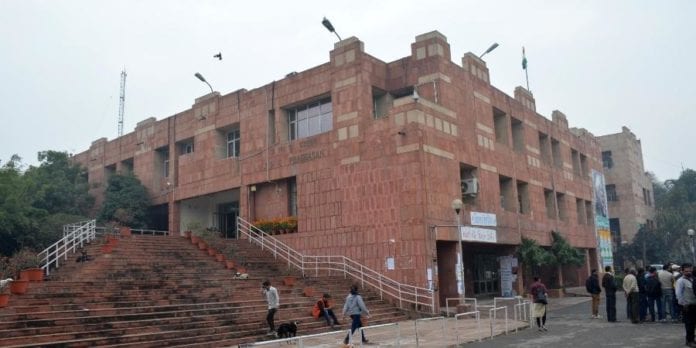A SURVEY ON JNU: ONLINE CLASSES PROVED A “BIG FAIL”
The lecturers came to know that only 4 teachers got internet support from the University and just 3 teachers got internet available from JNU for online teaching purposes.
A survey performed by two Jawaharlal Nehru University professors among lecturers of the university on online teaching has exhibited that more than 40 percent of pupils have not been able to access online education. It also indicated that over 97 percent of teachers obtained no “tech support” from JNU while supervising these classes.
ALSO READ:
Table of Contents
A SURVEY BY STUDENT’S GROUP, NEARLY 41.2 % DU STUDENTS’ HAVE NOT ATTENDED ONLINE CLASSES AT ALL
Summing everything, 66.2 percent of teachers asserted that admissions for the Academic Year 2020-21 should be postponed until January 2021” and 65.4 percent of teachers said that students be enabled to add/drop additional classes enrolled for in the Winter Semester 2020 when the university reopens.
The survey was begun by JNU lecturers Ayesha Kidwai and Atul Sood, who are also ex JNU Teachers’ Association presidents. It was performed through online circulation over five days, with only those instructors who were teaching a course appointed in Winter Semester 2020.
A total number of 131 teachers from nine schools partaken in the poll amounting to “42.25 percent of the 310 ‘faculty members implemented in online education’ that the JNU council has presented to the MHRD.
In the survey, we got to know that of the total 148 courses, less than 30 percent of the syllabus was done in 56 percent of the courses when the lockdown commenced. This was due to the heated turmoil and strike against the hostel fee rise that went on from October to December the previous year.
DEADLINE TO SUBMIT APPLICATION FOR UGC NET, CSIR UGC NET, JNUEE, AND OTHER ENTRANCES EXTENDED | CHECK THE UPDATES
All-around 73 percent of the lessons had no modifications to make them more uniform with an online mode of teaching, either in faculty committees or in the board of studies meetings. In BA and MAMSc programs, the stake of such courses was just below 80 percent,” the survey stated.
21 faculty members have had to go for personal subscriptions to online conferencing software in order to teach their classes online and at least one lesson has been run on the subscription pulled by a student, the report clarifies. They also got to know that virtual teaching has been much tougher for big classes, with more than 60 percent of such courses having poor student participation.
BA courses, with large lessons, have thus had far lower participation. Even in MA/MSc degrees, more than 40 percent of the courses contemplated in the survey had short online participation. On the contrary, M.Phil/Ph.D./MTech courses, with lower-class volumes had more participation… Many of these classes have less than five students and the poll demonstrates that numerous of the teachers teaching such courses could communicate with them individually, often modifying timing, length of exchanges, etc, to the various restrictions the students confronted, thereby improving participation, the report added.
JAWAHARLAL NEHRU UNIVERSITY (JNU): GOING TO INITIATE PAPERLESS PH.D
More than 70 percent of educators do not believe that online education successfully copies the offline in-person classroom in case of students’ needs and accomplishments or develop the circumstances for a greatly smooth or fair exercise for the teacher. They do not feel that the norms by which they have been educating online enable them to successfully comprehend whether students have understood the topics being taught, rectify their mistakes, allow for a free conversation with peers, or provide a decent basis for a test of students’ performance, the report said.
“They also stressful of the belief that such an online education worsens social and economic injustices between students…This is crucial in the light of proposals by the UGC (and the JNU VC’s enthusiastic welcoming of them), that up to 25% of course syllabi should be compulsorily taught online afterward,” it added.
The summary also said above 70 percent of instructors were in huge support of broadening the semester from 45 to 60 days after the period of reopening and performing in-class evaluations both for middle and final year pupils.
FOR MORE SUCH UPDATES FOLLOW US ON INSTAGRAM













